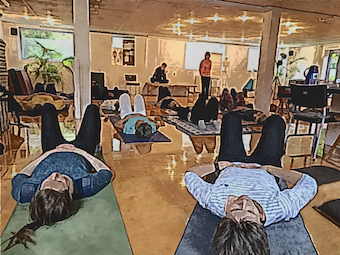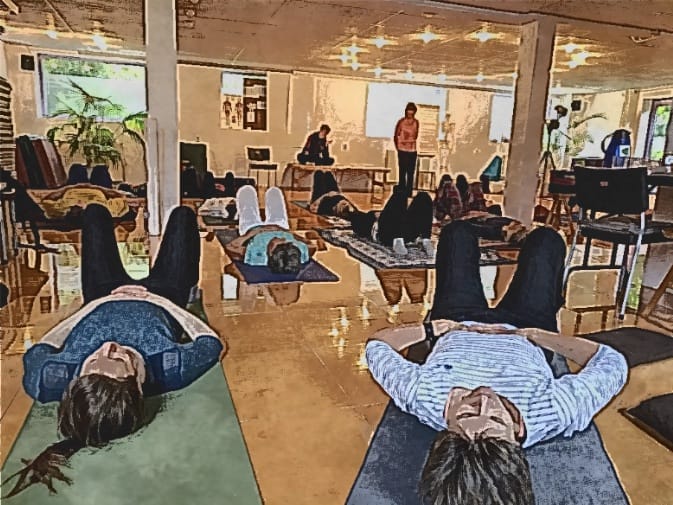
Genuine progress

Comfortable is nothing.
It’s what you’re used to.
— Moshe Feldenkrais
After nearly 50 years of Feldenkrais teacher training, a different kind of program appeared a few years ago. Instead of preparing participants to teach both aspects of the method—the individual table lessons, known as Functional Integration, and collective floor classes, called Awareness Through Movement (ATM)—these programs prepare people to teach the group modality exclusively.
In a departure from the previous three or four years of professional schooling, these ATM-only courses consist of ten weeks of instruction over two years. These programs aim to lower the required time to become a teacher, make the profession more accessible, and promote the spread of the method.
Though this truncated training may seem radical and, to some members of the profession, a disturbingly reckless departure from the established approach, there is historical precedent for this approach. Though mislabeled as a public workshop, During the summer of 1972, Moshe Feldenkrais conducted a training program at the Esalen Institute focused on preparing the participants to teach his approach to movement learning. (It took the Feldenkrais Guild of North America decades to recognize the graduates of this groundbreaking course as members of the profession.) The following summer, he taught another such program in Berkeley.
Both of Feldenkrais’ ATM teacher training programs were more or less five weeks long. If the goal is to make the method more accessible by shortening the time it takes to become a teacher, why are the new courses twice as long? What good could come from spending more time studying and mastering this material? Does the faculty of these programs think they know more than Moshe? What gives them the audacity to believe they could improve on the master?
Feldenkrais based his eponymous method on an integral belief in our profound, innate learning ability. The expanded programs are nothing more than greedy, misguided attempts to undermine this fundamental faith in human potential.
To put a stop to unfortunate, unnecessary training time inflation, I’m pleased to inform you that no one will have to waste valuable time and money learning Moshe’s foundational, transformative somatic education methodology. Instead, starting this summer, interested somanauts will be able to enroll in the Institute for Traditional Feldenkrais Education’s newly resuscitated five-week ATM-only Teacher Training Program.
It’s time to free ourselves from the crazy compulsion to innovate and make genuine progress in the only way possible—by going backward.
I made the image above a while back using a photo I took during one of the training programs I directed in Amsterdam and processing it with what is now, regrettably, defunct software.
The Feldenkrais quote is from the Berkeley ‘73 program. To be specific, he uttered those words on July 5th, during the remarkable, little-known HEAD AND TONGUE ON DIAL lesson, ATM 22.
Lest I forget, let me wish you an amusing, fun-filled April Fools Day. 😉
Your thoughts?
Please let us know your perspective! Add your comments, reactions, suggestions, ideas, etc., by first logging in to your Mind in Motion account and then clicking here.
Commenting is only available to the Mind in Motion Online community.
Join in by getting your free account, which gives you access to the e-book edition of Articulating Changes (Larry's now-classic Master's thesis), ATM® lessons, and more — all at no charge whatsoever.
To find out more and sign up, please click here.
Please share this blog post
 This work is licensed under a Creative Commons Attribution-ShareAlike 4.0 International License
This work is licensed under a Creative Commons Attribution-ShareAlike 4.0 International License
This blog may contain one or more affiliate links. When you click on a link and then make a purchase, Mind in Motion receives a payment. Please note that we only link to products we believe in and services that we support. You can learn more about how affiliate links work and why we use them here


You got me! 🙂
Thanks for letting me know, Robert. Happy Arril Fools Day!
OMG Larry! I thought you had gone cray!….. even the quote was 180 degrees off! You got me too!
Good morning, Anina.
The blog is gag, but (though you may not believe today . . . ) the quote is for real. NO KIDDING!
How exciting
😉
Thank you Larry, your intelligence always comes as an oasis in the Feldenkrais world. Keep me posted. Love from Bilbao❤️
Thank you, Maria, for your kind words.
I’ll definitely keep you posted!
Dear Larry, I really like this text, an intelligent way to share your opinion about this unhealthy development! (I have to admit, I had to read it twice to understand🙃)
Greetings from Vienna
Thank you, Marianne?
I’m glad you appreciated my April Fools post.
Uncertain.
‘Many a true word said in jest’
Thank you, Jeffrey.
I do think there’s a lot to be said about respecting and learning from the past. However, in keeping with the spirit of jest, I exxagerated the importance to restricting ourselves to our antecents.
Feldenkrais kept learning and developing his method throughout his life; for example, every one of his teacher training programs follows a unique lesson plan. I think it behooves us to follow in the tradition of recursive approximations that is at the heart of Moshe’s methodology.
Finally, in the face of the significance of the underlying issues, I think uncertainty is a good way to proceed.